“President Obama called it ‘the worst environmental disaster America has ever faced.’ So I thought I should face it and head to the Gulf”—these are the opening words on the popular blog Guilty Planet as the author, marine biologist Jennifer Jacquet, embarked on a ten day trip to Louisiana. As a scientist, Jacquet was, of course, interested in the impact of the some four million barrels of oil on the Gulf’s already depleted ecosystem, however she was as equally keen to see how Louisianans were coping with the fossil fuel-disaster that devastated their most vital natural resource just four years after Hurricane Katrina.
“It seems that the people of Louisiana are a special sub-population of humanity we could call Homo resilius. They have a certain resilience to disaster that probably only exists in challenged regions of the world, like Haiti, for instance,” she told mongabay.com, adding that her experience was paradoxical.
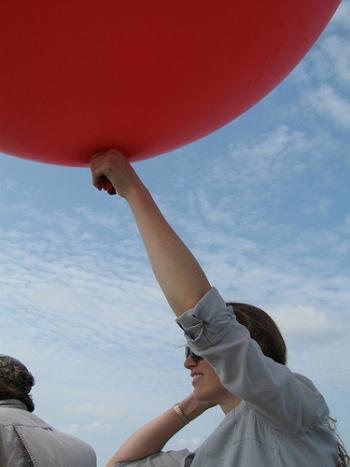 Jacquet participates in the Louisiana’s Bucket Brigade Grassroots Mapping Project in Bay Baptiste. Photo courtesy of Jennifer Jacquet. |
“When I was there, I seriously thought parts of Louisiana were like hell on earth. And then I left and I thought everywhere else seemed boring in comparison. Louisiana and the people who live there are really special.”
Jacquet says that while the news media is focusing on the obvious effects of the Gulf spill, such as oiled birds, “it seems many of the effects will be more insidious. Scientists I spoke to are particularly concerned about the larval phases of fish and invertebrates, which are planktonic and not able to avoid patches of oil the way free-swimmers might. ”
Despite the vast damage, Jacquet believes BP will get off easy, saying that “the ecology of the Gulf was already crippled” before the spill. Overfishing, industrial pollution, vast algal blooms, and nutrient-rich runoff from agriculture creating ‘dead zones’ have long pummeled the ecosystem of the Gulf of Mexico.
“I worry BP will be able to subvert recovery because there is inadequate baseline data,” explains Jacquet, “and BP is aware of every insufficiency because their people sit in on every single discussion with Fish & Wildlife and beyond. I think BP’s ubiquitous involvement in the recovery process will corrupt it.”
She adds that scientists won’t be provided the resources necessary to document the full impact of the oil spill.
While a longtime supporter of President Obama, Jacquet says that the “Obama Administration’s response [to the oil disaster] confirms, again and again, that corporations—be it banks, insurance companies, or oil—control the politics in this country, not the people.”
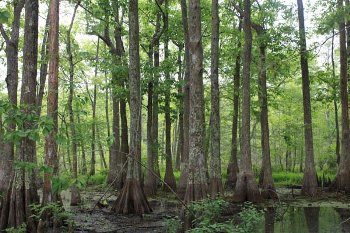 Cypress forest in the Lacassine National Wildlife Refuge in Louisiana taken just before the oil spill. Photo by: Rhett A. Butler. |
As to the underlying reason for the spill—America’s dependence on fossil fuels—Jacquet does not mince words.
“The quest for oil is not necessary. In fact, it’s a major liability. We need to end our reliance on oil for reasons of national security, global climate change, and other ecological impacts. To continue business as usual given what we know is not only detrimental to humanity and all other life on Earth but it’s just shamefully unimaginative.”
Mongabay.com caught up with Jennifer Jacquet after her trip to discuss her impressions of an ecosystem ravaged by oil and a people coping with ecological collapse.
AN INTERVIEW WITH JENNIFER JACQUET
Mongabay: What’s your background?
Jennifer Jacquet: I am a post-doctoral researcher at the University of British Columbia examining fisheries issues and broader questions related to cooperation.
Mongabay: What made you decide you needed to see the impacts of the Gulf oil disaster for yourself?
Jennifer Jacquet: After President Obama described the Gulf oil spill as ‘the worst environmental disaster America has ever faced’, I thought I should see it firsthand.
THE DISASTER
Mongabay: As a scientist, how large do you think the impact of the spill will be on the ecology of the Gulf of Mexico’s marine life?
Jennifer Jacquet: There are the obvious effects like oiled birds and saltmarshes, but it seems many of the effects will be more insidious. Scientists I spoke to are particularly concerned about the larval phases of fish and invertebrates, which are planktonic and not able to avoid patches of oil the way free-swimmers might. Experiments conducted after Exxon Valdez have shown that very small amounts of oil can have sublethal affects as well. Fortunately for BP, the ecology of the Gulf was already crippled.
Mongabay: Do you think we will ever know the full impact or is this simply beyond our current ecological understanding and technology (i.e. reaching the deep sea)?
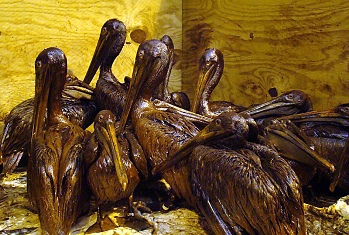 Oiled brown pelicans captured at Grand Isle, Louisiana on Thursday, June 3, 2010 wait to be cleaned of Gulf spill crude at The Fort Jackson Wildlife Care Center in Buras, Louisiana. Photo courtesy of International Bird Rescue Research Center. |
Jennifer Jacquet: We will never be given the resources to know the full impact. Again, I think many of the effects will be insidious and very difficult to quantify. We will have to rely a lot on analogue experiments in laboratories.
Mongabay: What is your biggest concern for marine life?
Jennifer Jacquet: Imagining the mass suffering is hard to stomach but from a more scientific perspective, I worry BP will be able to subvert recovery because there is inadequate baseline data. And BP is aware of every insufficiency because their people sit in on every single discussion with Fish & Wildlife and beyond. I think BP’s ubiquitous involvement in the recovery process will corrupt it, as well as other things.
Mongabay: You visited an International Bird Rescue station. What was it like seeing these now iconic victims in person?
Jennifer Jacquet: It struck me as Orwellian. First off, the brown pelican just came off the endangered species list last November and then the oil hits the birds, the rookeries, everything. It takes a boat filled with life-vest-wearing biologists to capture the oiled birds before they are transported to the center. Then four humans who are trained as vet techs wash a bird with nothing more than Dawn soap and a high pressure hose. The pelicans come out looking freshly laundered because they have been stripped of both the BP oil as well as their natural oils. The pelicans sit outside in cages for a week before while they regain their sleekness and then BP pays from them to be trucked or flown to some park in Georgia or Florida. I can only imagine what the pelicans were thinking.
Mongabay: You asked a US Fish and Wildlife official if the birds were receiving better healthcare than many people in the US. What’s your opinion?
Jennifer Jacquet:In some cases, yes. But I suppose that’s beside the point. Given how wealthy this country is, there is no reason why humans, birds, and other wildlife should not live relatively healthy lives. The problem is, both humans and animals are being poisoned by an industrial lifestyle but only humans can try to avoid it and, better still, do something about it.
Mongabay: What will happen to migrating birds en-route to the region?
Jennifer Jacquet: It’s something people at the Rescue center didn’t want to discuss because it’s simply too daunting . I really don’t know enough to speculate but I suspect, as most everyone probably does, that the prognosis isn’t good. Even if the migratory birds manage to avoid direct contact with oil, what about the food they eat?
THE PEOPLE
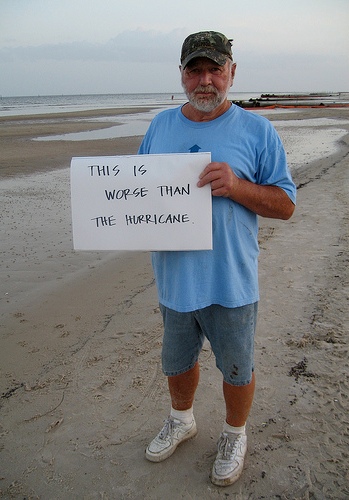 As a part of the trip Jacquet photographed locals making statements about the spill. Photo courtesy of Jennifer Jacquet. |
Mongabay: How are the people of Louisiana coping in face of America’s worse environmental disaster after still recovering from Katrina?
Jennifer Jacquet: I have a limited perspective but it seems that the people of Louisiana are a special sub-population of humanity we could call Homo resilius. They have a certain resilience to disaster that probably only exists in challenged regions of the world, like Haiti, for instance.
Mongabay: You attended Worldwide Protest BP Day in New Orleans. What was that like?
Jennifer Jacquet: Pathetic. There were probably 40 people protesting. I think there were bigger assemblages in Michigan.
Mongabay: You wrote in one of your blogs that Louisiana is a ‘red state’ with a lot of ‘blue problems’. Could you tell us more about that statement?
Jennifer Jacquet: After desegregation, Louisiana turned from a state that consistently voted Democratic to a state that most often elects Republicans, with the exception of southern governors-turned-Presidents Carter and Clinton. You can decide for yourself why that happened. Today, there is a general anti-government, anti-regulation sentiment and yet the state sits in the path of major hurricanes and other changes that require large scale, government-sponsored relief and construction projects. The state also has a very active oil & gas industry that obviously requires federal regulation. More than 6000 oil platforms and rigs, many of which have been decommissioned, have been placed the Gulf.
Mongabay: Who are the people blaming the most: BP for negligence, the government for deregulation, or themselves for oil consumption?
Jennifer Jacquet: Around the French Quarter, people are blaming BP but outside of New Orleans, people were far more reticent, particularly because many people are involved in the oil and gas industries. It would be interesting to put it to a Gulf-wide vote.
Mongabay: What memory sticks out most from your time in Louisiana?
Jennifer Jacquet: Probably the paradox of my impression. When I was there, I seriously thought parts of Louisiana were like hell on earth. And then I left and I thought everywhere else seemed boring in comparison. Louisiana and the people who live there are really special. The place is literally and figuratively always shifting. Unpredictable.
THE RESPONSE, or WHERE DO WE GO FROM HERE
Mongabay: From your perspective on the ground, how well has the government done in responding to the disaster?
 Protest in New Orleans against BP. Photo courtesy of Jennifer Jacquet. |
Jennifer Jacquet: I am a huge Obama fan and his election renewed my faith in democracy, so it’s hard to say this. But the Obama Administration’s response confirms, again and again, that corporations—be it banks, insurance companies, or oil—control the politics in this country, not the people.
Mongabay: After this disaster, what are your feelings on the environmental safety of offshore drilling? Should we ban off-shore drilling in the Gulf? Should we ban it everywhere?
Jennifer Jacquet: I will paraphrase a blog comment that I thought seemed both funny and pragmatic. We should ban offshore oil drilling everywhere except the Gulf because 1) there is clearly a lot of oil there and 2) we have already ruined the place. In addition, Louisiana, which opposed the national moratorium on deepwater oil drilling, will have no objections.
Mongabay: What do you say to the argument that the spill is the fault of environmentalists for lobbying against on-shore drilling on land?
Jennifer Jacquet: Ha. If anything, this is just another reason to oppose oil from any medium and divert more resources toward reducing consumption and seeking out renewable energies.
Mongabay: Should the oil disaster in the Gulf be taken as a billboard for the need to get off oil entirely or as a regrettable disaster in the necessary quest for more oil?
Jennifer Jacquet:The quest for oil is not necessary. In fact, it’s a major liability. We need to end our reliance on oil for reasons of national security, global climate change, and other ecological impacts. To continue business as usual given what we know is not only detrimental to humanity and all other life on Earth but it’s just shamefully unimaginative.
Past Articles Featuring Jennifer Jacquet’s Work
Marine scientist calls for abstaining from seafood to save oceans

(06/08/2009) In April marine scientist Jennifer Jacquet made the case on her blog Guilty Planet that people should abstain from eating seafood to help save life in the ocean. With fish populations collapsing worldwide and scientists sounding warnings that ocean ecosystems—as edible resources—have only decades left, it is perhaps surprising that Jacquet’s call to abstain from consuming seafood is a lone voice in the wilderness, but thus far few have called for seafood lovers to abstain.
One-third of global marine catch used as livestock feed
(10/30/2008) Despite continuous warnings of emptying oceans due to overfishing, a new report finds that one-third of the world’s total marine catch is not feeding humans, but livestock. The fish are ground-up into meal and fed to pigs, poultry, and even farm-raised fish.
Small-scale fisheries are “best hope” for sustainability in developing world

(09/08/2008) Fish stocks are declining globally. While the consumer in the industrial world has yet to feel the full impact of this decline, those in the developing world know it well. Local small-scale fishermen are catching less fish to feed growing populations. Jennifer Jacquet of the Sea Around Us Project believes the hope for sustainable seafood lies in these very fisheries.
More coverage of the BP oil disaster
Oil devastates indigenous tribes from the Amazon to the Gulf
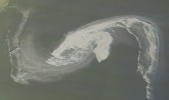
(07/27/2010) For the past few months, the mainstream media has focused on the environmental and technical dimensions of the Gulf mess. While that’s certainly important, reporters have ignored a crucial aspect of the BP spill: cultural extermination and the plight of indigenous peoples. Recently, the issue was highlighted when Louisiana Gulf residents in the town of Dulac received some unfamiliar visitors: Cofán Indians and others from the Amazon jungle. What could have prompted these indigenous peoples to travel so far from their native South America? Victims of the criminal oil industry, the Cofán are cultural survivors. Intent on helping others avoid their own unfortunate fate, the Indians shared their experiences and insights with members of the United Houma Nation who have been wondering how they will ever preserve their way of life in the face of BP’s oil spill.
Who’s really accountable for the BP oil spill?
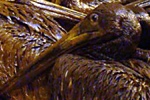
(07/25/2010) Reading articles in the newspapers recently and online, I find the media’s focus is on scrutinizing BP’s way of paying for the damage done when an estimated 76,934,000 gallons of their oil leaked out into the Gulf of Mexico after the explosion of their Deepwater Horizon rig in April. It is not that they are being criticised for not standing up and taking full responsibility for their recklessness that caused the spill, but instead they are being accused of not paying enough money for its clean-up. Taxpayers are outraged that they may pick-up the tab and are demanding to know why they should be held accountable when the disaster wasn’t their fault. Yet, do we not all have a part to play in this catastrophe?
Oil disaster threatens Gulf of Mexico’s deep water titans
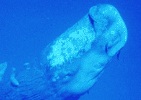
(07/19/2010) As I discovered in the course of researching my book, No Rain in the Amazon: How South America’s Climate Change Affects the Entire Planet (Palgrave, 2010), the oil industry has had a poor record when it comes to protecting aquatic sea life. Take for example the manatee, which has been put at risk from the Amazon to the Gulf of Mexico as a result of the oil industry. One of the most outlandish creatures on the planet, the shy and retiring manatee, which gets its name from an American Indian word meaning “Lady of the Water,” was first described as a cross between a seal and hippo. The creature has a wonderfully round body, mostly black skin the texture of vinyl, a bright pink belly, a diamond-shaped tail and a cleft lip.
Goodbye to the Gulf: oil disaster hits region’s ‘primary production’

(07/08/2010) According to a new analysis by the World Resources Institute (WRI), the many ecosystem services provided by the Gulf of Mexico will be severely impacted by BP’s giant oil spill. ‘Ecosystem services’ are the name given by scientists and experts to free benefits provided by intact ecosystems, for example pollination or clean water. In the Gulf of Mexico, such environmental benefits maintain marine food production, storm buffers, tourism, and carbon sequestration, but one of the most important of marine ecosystem services is known as ‘primary production’.
Will we ever know the full wildlife toll of the BP oil spill?

(06/08/2010) Will we ever know the full wildlife toll of the BP oil spill? The short answer: no. The gruesome photos that are making the media rounds over the last week of oiled birds, fish, and crustaceans are according to experts only a small symbol of the ecological catastrophe that is likely occurring both in shallow and deep waters. Due to the photos, birds, especially the brown pelican, have become the symbol of the spill to date. But while dozens of birds have been brought to rescue stations covered in oil, the vast majority will die out at sea far from human eyes and snapping cameras, according to Sharon Taylor a vet with the US Fish and Wildlife Service.
The Gulf oil spill in context: US oil consumption
(05/31/2010) The US government has now confirmed that the oil spill in the Gulf of Mexico is the United States’ largest oil spill and perhaps the nation’s worst environmental disaster. While poor government oversight and negligence by oil giant BP certainly contributed to the disaster, the fact that the US is drilling over a mile below the surface in one of its most important marine ecosystems is directly related to US consumption of oil: the highest in the world.







